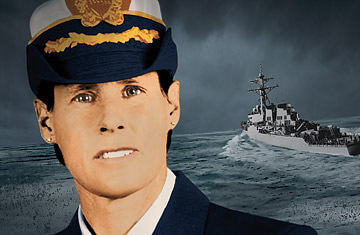
It should have been clear to the U.S. Navy that Holly Graf wasn't fit for command when her destroyer steamed out of a Sicilian port in 2003 on the eve of the Iraq war. Without warning, all 9,000 tons of the U.S.S. Winston S. Churchill shuddered as it cleared the harbor's breakwater. The screws stopped turning, and the 511-ft.-long ship was soon adrift. "What the hell happened?" Commander Graf demanded from the bridge. She grabbed her cowering navigator and pulled him onto the outdoor bridge wing. "Did you run my f___ing ship aground?" she screamed. Not only was this a possible naval disaster, but it was a diplomatic one as well: the navigator was an officer in the British Royal Navy, a billet unique to the Churchill.
But amid all the chaos and shouting, the sound heard next was more startling. Sailors on the Churchill's stern, suspecting that their ship had run aground--meaning Graf's career would be instantly over--broke gleefully into song: "Ding dong, the witch is dead!" Newly arrived Navy chaplain Maurice Kaprow could not believe what he was seeing and hearing. "Someone came up to me and said, 'We've run aground--she's finished,'" he recalls. "I was flabbergasted. They were jumping for joy and singing on the fantail." As it turned out, one of the ship's propellers had broken. But seven years later, Kaprow still cannot fathom which was worse: that U.S. sailors were openly heckling a captain or that the captain seemed to deserve it.
Graf's next command, as captain of the guided-missile cruiser U.S.S. Cowpens, would be her last. Graf was relieved of duty in January, after nearly two years on the Cowpens, for "cruelty and maltreatment" of her crew, according to a blistering Navy inspector general's report obtained by Time. The report has rocked the service to its bilges because it calls into question the way the Navy chooses, promotes and then monitors its handpicked skippers. The saga of Holly Graf suggests the Navy had long ignored warning signs about her suitability for command. And while news of her spectacular fall instantly raised questions about institutional sexism, the lesson may be the opposite, as her case highlights how the Navy has pushed to integrate women into its war-fighting fleet.
Master and Commander
Holly Graf had dreamed of skippering a Navy vessel ever since her high school days in Simsbury, Conn. Her father was a Navy captain, and her sister Robin wanted to go to sea too. (Robin eventually became an admiral--and married one; Holly is single.) After she graduated from the U.S. Naval Academy in 1985, colleagues sensed that Graf was on a fast track to flag rank.
